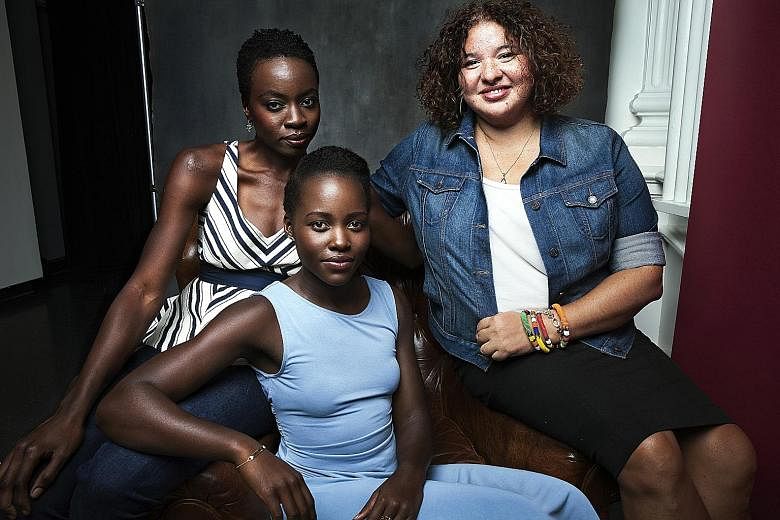NEW YORK • A few days after arriving at the Yale School of Drama from Kenya in 2009, Lupita Nyong'o found herself understudying in a professional production of Eclipsed, Danai Gurira's harrowing play about women in the second Liberian civil war.
"I never had to go on," Nyong'o recalled recently, pantomiming a relieved wipe of the brow.
But Gurira's play - and the role of the Girl, the youngest of four captive wives of a rebel commander - stuck with her. And so when Oskar Eustis, artistic director of the Public Theater, met her last year to discuss a return to the stage after the frenzy surrounding her Oscar-winning screen debut in 12 Years A Slave (2013), Nyong'o was adamant.
"I had sat down with myself after the whirlwind year I'd had and thought about what I really wanted to do and it was just Eclipsed," she said. "So when Oskar offered me some plays to read and asked whether I'd be interested in doing any of them, I just said, 'Nope, I want to do Eclipsed'."
And now, she is. Eclipsed, which begins previews at the Public tomorrow and runs through Nov 29, marks Nyong'o's New York stage debut as well as her first appearance on any stage since 12 Years A Slave catapulted her to celebrity.
The production also reunites Nyong'o with two other African women artists who are blending serious theatrical careers with high-profile gigs in the global entertainment complex.
Gurira, a Zimbabwean-American whose plays about African women have won her an Obie award and other accolades, also happens to wield the sword as Michonne, the fierce warrior on AMC's smash-hit The Walking Dead. And the play's director, South African-born Liesl Tommy, has been tapped for a major movie project.
Eclipsed, with its intense subject matter and painstakingly authentic (and often surprisingly funny) Liberian English dialogue, did not have an easy route to New York.
But Eustis said that while Nyong'o's interest drove the project, the play's subtle depiction of a group of women struggling to salvage some humanity amid the war's horror - performed by an ensemble of mostly African actresses - more than carries the day.
"In rehearsal, you feel very much that you're in a room that is not only making a show about African women, but one that is led by African women," he said.
Nyong'o and Gurira, who have been friends since the mid-2000s, and Tommy, who also directed the 2009 Yale production, talked about their collaboration in a joint interview at the Public last weekend.
Lupita, your film career has gone crazy since 12 Years A Slave. Why did you want to return to the stage right now and why with this play?
Nyong'o: I did a lot of expressing of myself during the campaign for 12 Years and I needed to get back to who I was as a performer, as an actor, as a beginner.
The thing about winning a prestigious award is that in a sense you're being told that you're an expert. But when you play a role, you're always a beginner. And I love the communal experience of theatre, of getting to really go deep and to play with other people and create together.
I grew up in a country and in a world that consumed a lot of Western popular culture and so I was starved for stories about people like me.
This seemed like a prime opportunity to do a story about Africans that also really allowed me to stretch myself, to experience totally different circumstances from the ones I grew up in.
You were each born or raised in different parts of Africa. Does that broader African identity allow you all to bring something specific to this particular story about Liberia?
Tommy: I have been very adamant with the audition process from the beginning about wanting to look for African actresses. We see a lot of depictions of ourselves that are just not accurate. This is going to be controversial, but it's torture for me to watch a lot of non-African people who play Africans. There's just so much that is affected. It's a Western idea of what African-ness is. It's often a very general idea, which to me is death.
You have all gotten huge opportunities in film and TV, with projects like Star Wars and The Walking Dead. Is being part of that globalised entertainment phenomena something you even imagined when you were starting out?
Nyong'o: There's value in dichotomy, yin and yang. What the three of us are doing is diversifying the stories that African bodies are telling. At the end of the day, to be African is to be human and so we can participate in big franchises or what have you and bring our spirit and colour to that world and, at the same time, do something that's about ourselves in a more specific way.
NEW YORK TIMES

